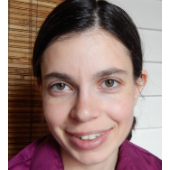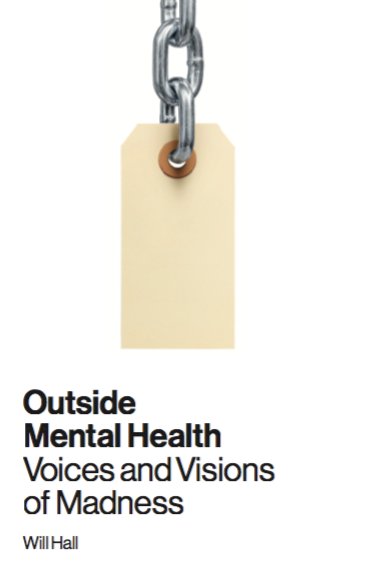Redefining Research: Nev Jones
First Aired: 04-01-2014 -- 2 comments | Add comment

What if researchers collaborated with patients rather than treating them as “informants” and objects of study? Nev Jones survived her mother’s frightening extreme states — and then her own mind unravelled into different realities. She was herself diagnosed with schizophrenia, and began a lifelong exploration of the uniqueness of madness.
Today Nev is a post-doctorate fellow at Stanford University, founder of Chicago Hearing Voices and the Lived Experience Research Network, and part of the the movement to create alternatives to professional control of research on psychosis.
http://depaul.academia.edu/NevJones
http://www.chicagohearingvoices.org
Podcast: Play in new window | Download (Duration: 47:50 — 43.8MB)
Subscribe: RSS



























 Creative Commons 2.5 copyright
Creative Commons 2.5 copyright
I have been very concerned about this interview because for large parts it talks /about/ another mad person (the interviewee’s mother) in depth without her consent. A person who is not anonymized and can be identified easily by the larger public.
This is wrong on so many levels.
Self-outing as a mad person is a courageous thing. You cannot take that decision for anybody else and out them publicly.
Even if it was anonymized it would still have the bitter taste of the voice of the person missing.
I think it is deeply disturbing to hear forced “treatment” defended as an answer to helplessness of the “helper”. But the issue of publicly “diagnosing” a non-consenting, absent person is even more violating.
While the concern for privacy and speaking for oneself is very important, and rightly at the center of the values of our “nothing about us without us” movement, I support this interview and Nev speaking as a survivor and disagree with your idea that survivors are in a special class of handlign that we need consent to be talked about, unlike “normal” people.
While the issues here are complicated, dogmatically following the logic that “we can’t talk about anyone with a diagnosis” can lead us to silence our own stories, cover up abuse, duplicate the twisted clinical uses of “privacy” and create a double standard that patients are not also humans.
I think the difficulty is that Nev and her mom are in a conflict and so it’s always hard to hear one side of a story, but I believe that doesn’t mean /no/ side of the story should be heard. Telling Nev, a diagnosed person, that she can’t share her story because it involved mistreatment by another diagnosed person would in my mind be silencing.
My own father has a psych diagnosis and I speak about it without his consent because to not speak about it would do the job of the hospitals and doctors covering up his experience. That he is a psych survivor is an important part of my own story and understanding what I have been through. And because he is someone who has mistreated me if I am silent about him I am just covering up my own abuse experiences. My father doesn’t necessary like that I talk about him, and wouldn’t agree with my perspective. That’s often the nature of abuse and violence – different points of view and one side wanting the other to keep quiet.
As a society we talk about our families. To say “you can talk about your mom if she doesn’t have a diagnosis, but you can’t talk about her if she does” is a kind of clinical policing that just puts patients into some special different category than the rest of society. That in itself is a stigma.
To me the key here is compassion, intent, and context. If I was just trying to attack my father without any real understanding or caring then yes mentioning his diagnosis would be hurtful. But my intention is to bring caring to all sides of a complicated family history and break silence about abuse.
I am not perfect how I speak about my father, no one can be when they speak about their families as it is impossible to be objective around such intimate realities. My father of course would have his own point of view and I don’t speak for him, and it’s obvious that if his voice is missing a piece of the story is missing. But I choose to speak about him as part of telling my story and I believe in my choice. I’ve thought about keeping more silent and just honestly believe that healing and caring are better served by coming out rather than keeping silent. I saw how keeping silent harmed my family growing up.
I believe that the way that Nev has talked about her family, especially in the context of her own survival of mistreatment, is supportable and ethical and furthers the larger motivation of this interview to support /all/ survivors of abuse and mistreatment and bring caring to family situations. Nev’s experience is that her mother mistreated her – that her mom did it as part of her madness does not excuse what her mom did or give her mom special privacy privileges. Abuse has been covered up for generations in the name of privacy and propriety. To demand that Nev or anyone keep secrets in the name of privacy risks perpetuate the very social secrecy and cover up that makes abuse possible. I’m glad Nev is breaking the taboo.
Nev explained the dilemmas around forced treatment very compassionately. No one is making a dehumanizing argument here in favor of forced treatment or that people in states of madness can’t ever be reached or that alternatives don’t need to be found. On the contrary Nev has been a vocal advocate of change. The story here is about a tragic lack of social and community support putting abuse survivors – both Nev and her mom – in an impossible situation that needed an imperfect solution. This is the real dilemma many families face around force. It’s a reality we need to engage with as we work to change society and mental health care.
You’re making a strong case for not publishing this interview, and I’m going to push back and make a strong case for why we published it: absolutist positions and dogmatic double standards don’t serve real compassion or real change. We need to understand the details and complexity of force, and I think Nev’s story helps us do that.
This is a really valuable conversation and I’m glad you spoke up about it, I’m sure you’ve touched on concerns many people have and it’s good to go deeper with it all.